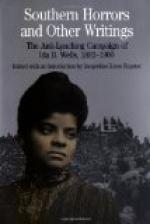Ida B. Wells
New York City, Oct. 26, 1892
To the Afro-American women of New York and Brooklyn, whose race love, earnest zeal and unselfish effort at Lyric Hall, in the City of New York, on the night of October 5, 1892—made possible its publication, this pamphlet is gratefully dedicated by the author.
HON. FRED. DOUGLASS’S LETTER
Dear Miss Wells:
Let me give you thanks for your faithful paper on the lynch abomination now generally practiced against colored people in the South. There has been no word equal to it in convincing power. I have spoken, but my word is feeble in comparison. You give us what you know and testify from actual knowledge. You have dealt with the facts with cool, painstaking fidelity and left those naked and uncontradicted facts to speak for themselves.
Brave woman! you have done your people and mine a service which can neither be weighed nor measured. If American conscience were only half alive, if the American church and clergy were only half christianized, if American moral sensibility were not hardened by persistent infliction of outrage and crime against colored people, a scream of horror, shame and indignation would rise to Heaven wherever your pamphlet shall be read.
But alas! even crime has power to reproduce itself and create conditions favorable to its own existence. It sometimes seems we are deserted by earth and Heaven yet we must still think, speak and work, and trust in the power of a merciful God for final deliverance.
Very truly and gratefully yours,
Frederick Douglass
Cedar Hill, Anacostia, D.C., Oct. 25, 1892
1 The offense
Wednesday evening May 24, 1892, the city of Memphis was filled with excitement. Editorials in the daily papers of that date caused a meeting to be held in the Cotton Exchange Building; a committee was sent for the editors of the Free Speech an Afro-American journal published in that city, and the only reason the open threats of lynching that were made were not carried out was because they could not be found. The cause of all this commotion was the following editorial published in the Free Speech May 21, 1892, the Saturday previous.
Eight negroes lynched since last issue of the Free Speech one at Little Rock, Ark., last Saturday morning where the citizens broke(?) into the penitentiary and got their man; three near Anniston, Ala., one near New Orleans; and three at Clarksville, Ga., the last three for killing a white man, and five on the same old racket—the new alarm about raping white women. The same programme of hanging, then shooting bullets into the lifeless bodies was carried out to the letter.
Nobody in this section of the country believes the old thread-bare lie that Negro men rape white women. If Southern white men are not careful, they will overreach themselves and public sentiment will have a reaction; a conclusion will then be reached which will be very damaging to the moral reputation of their women.
The Daily Commercial of Wednesday following, May 25, contained the following leader:




